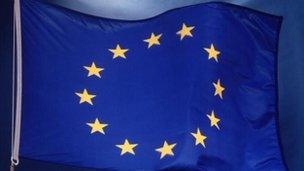Audit of EU powers published by ministers
- Published

Ministers say there should be "less meddling" in areas that should be left to national jurisdictions
The first details of an audit of EU powers, which Tory MPs hope will be the basis of a future re-negotiation of the UK's membership, have been published.
The "balance of competences" review, external, begun last year, is examining which powers are delegated to Brussels and which are retained by the UK.
David Cameron has pledged to hold a referendum on Europe in 2017 if the Conservatives win the next election.
No 10 said Monday's review was an "important part" of the EU debate.
The Conservatives argue too many powers have been relinquished over a number of years and the UK Parliament should have the final say over a much wider swathe of policy areas.
'Valuable'
The prime minister has said he would like to repatriate powers in certain areas before holding a referendum, although he has not spelt out in detail what they are. Any change would require the agreement of the other 27 EU nations.
Monday's audit covers six areas: the single market, health, overseas aid, foreign policy, animal health and welfare and tax. The full review is expected to be completed next year.
Foreign Secretary William Hague said the process would provide an "accurate and detailed picture of the impact that the European Union has on our everyday lives".
He said the first reports demonstrated the importance of maintaining national control over taxation and other economic levers while highlighting the benefits of co-operation in other areas, such as consumer rights.
"In some cases, they have confirmed and illustrated what we believed already," he said. "In others, they have thrown up new evidence and perspectives on our relationship with the EU."
"At a time when the EU is facing considerable challenges and discussion on the EU in Britain is intensifying, it is vitally important that the debate in the UK is as well-informed as possible.
"These reports make a valuable contribution, not only to the debate in this country, but also to the debate taking place in other European nations about the future of the EU."
The government committed itself to holding a "comprehensive and detailed" review of the extent of EU powers and their impact on the UK in its 2010 coalition agreement.
Ministers have rejected suggestions this is a step towards disengaging from or leaving the EU, claiming the exercise is long overdue and will inform future decision-making and efforts to reduce bureaucracy.
Labour has said it does not oppose a "factual analysis" but has questioned the timing and the motivation of the exercise - which has been co-ordinated by the Foreign Office and Cabinet Office.
The Lib Dems said the report should inject "a welcome dose of realism" into the debate on Britain 's EU membership.
"Most importantly, it underlines that being an influential member of the EU single market is vital for jobs and growth in the UK," Fiona Hall, who heads the Lib Dem group in the European Parliament, said.
"Liberal Democrats have always been passionate about improving the EU. However, we have made it clear that the balance of competences review should not be used to make a shopping list of powers to be repatriated back to the UK."
'Pretence'
Downing Street said the prime minister's views about Europe were "clear" and he believed it was important the public had "the evidence and analysis" to consider the question of the UK's membership.
But the UK Independence Party (UKIP)) said the prime minister was being "disingenuous" since Conservative MEPs had voted for more than 60% of legislative proposals debated in the European Parliament this year.
"Cameron's Conservatives long ago gave up the pretence of euroscepticism," UKIP leader Nigel Farage said. "They are fully signed-up to the EU project both back at home and in the European Parliament.
"Whilst UKIP wants the EU to have less power and less control and certainly spend less money, the Conservatives voted to give up to another 90m euros to Georgia and for Latvia to adopt the euro."
Further audit reports, including on asylum, immigration, trade, environment, transport, civil justice, tourism and labour market issues will be published later this year.